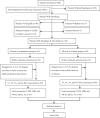Does the addition of specific acupuncture to standard swallowing training improve outcomes in patients with dysphagia after stroke? a randomized controlled trial
- PMID: 25819076
- PMCID: PMC4767143
- DOI: 10.1177/0269215515578698
Does the addition of specific acupuncture to standard swallowing training improve outcomes in patients with dysphagia after stroke? a randomized controlled trial
Abstract
Objective: To assess the effect of adding acupuncture to standard swallowing training for patients with dysphagia after stroke.
Design: Single-blind randomized controlled trial.
Setting: Inpatient and outpatient clinics.
Subjects: A total of 124 patients with dysphagia after stroke were randomly divided into two groups: acupuncture and control.
Interventions: The acupuncture group received standard swallowing training and acupuncture treatment. In comparison, the control group only received standard swallowing training. Participants in both groups received six days of therapy per week for a four-week period.
Main measures: The primary outcome measures included the Standardized Swallowing Assessment and the Dysphagia Outcome Severity Scale. The secondary outcome measures included the Modified Barthel Index and Swallowing-Related Quality of Life, which were assessed before and after the four-week therapy period.
Results: A total of 120 dysphagic subjects completed the study (60 in acupuncture group and 60 in control group). Significant differences existed in the Standardized Swallowing Assessment, Dysphagia Outcome Severity Scale, Modified Barthel Index, and Swallowing-Related Quality of Life scores of each group after the treatment (P < 0.01). After the four-week treatment, the Standardized Swallowing Assessment (mean difference - 2.9; 95% confidence interval (CI) - 5.0 to - 0.81; P < 0.01), Dysphagia Outcome Severity Scale (mean difference 2.3; 95% CI 0.7 to 1.2; P < 0.01), Modified Barthel Index (mean difference 17.2; 95% CI 2.6 to 9.3; P < 0.05) and Swallowing-Related Quality of Life scores (mean difference 31.4; 95% CI 3.2 to 11.4; P < 0.01) showed more significant improvement in the acupuncture group than the control group.
Conclusions: Acupuncture combined with the standard swallowing training may be beneficial for dysphagic patients after stroke.
Keywords: Dysphagia; acupuncture; stroke; swallowing training.
© The Author(s) 2015.
Conflict of interest statement
Figures
References
-
- Daniels SK, Brailey K, Priestly DH, Herrington LR, Weisberg LA, Foundas AL. Aspiration in patients with acute stroke. Arch Phys Med Rehabil 1998; 79: 14–19. - PubMed
-
- Smithard DG, O’Neill PA, Park C, et al. Can bedside assessment reliably exclude aspiration following acute stroke? Age Ageing 1998; 27: 99–106. - PubMed
-
- Nakajima M, Inatomi Y, Yonehara T, Hashimoto Y, Hirano T. Acquisition of oral intake in severely dysphagic patients with acute stroke: A single-center, observational study involving a database of 4972 consecutive stroke patients. J Neurol Sci 2012; 323: 56–60. - PubMed
-
- Martino R, Foley N, Bhogal S, Diamant N, Speechley M, Teasell R. Dysphagia after stroke: incidence, diagnosis, and pulmonary complications. Stroke 2005; 36: 2756–2763. - PubMed
Publication types
MeSH terms
Associated data
LinkOut - more resources
Full Text Sources
Other Literature Sources
Medical


